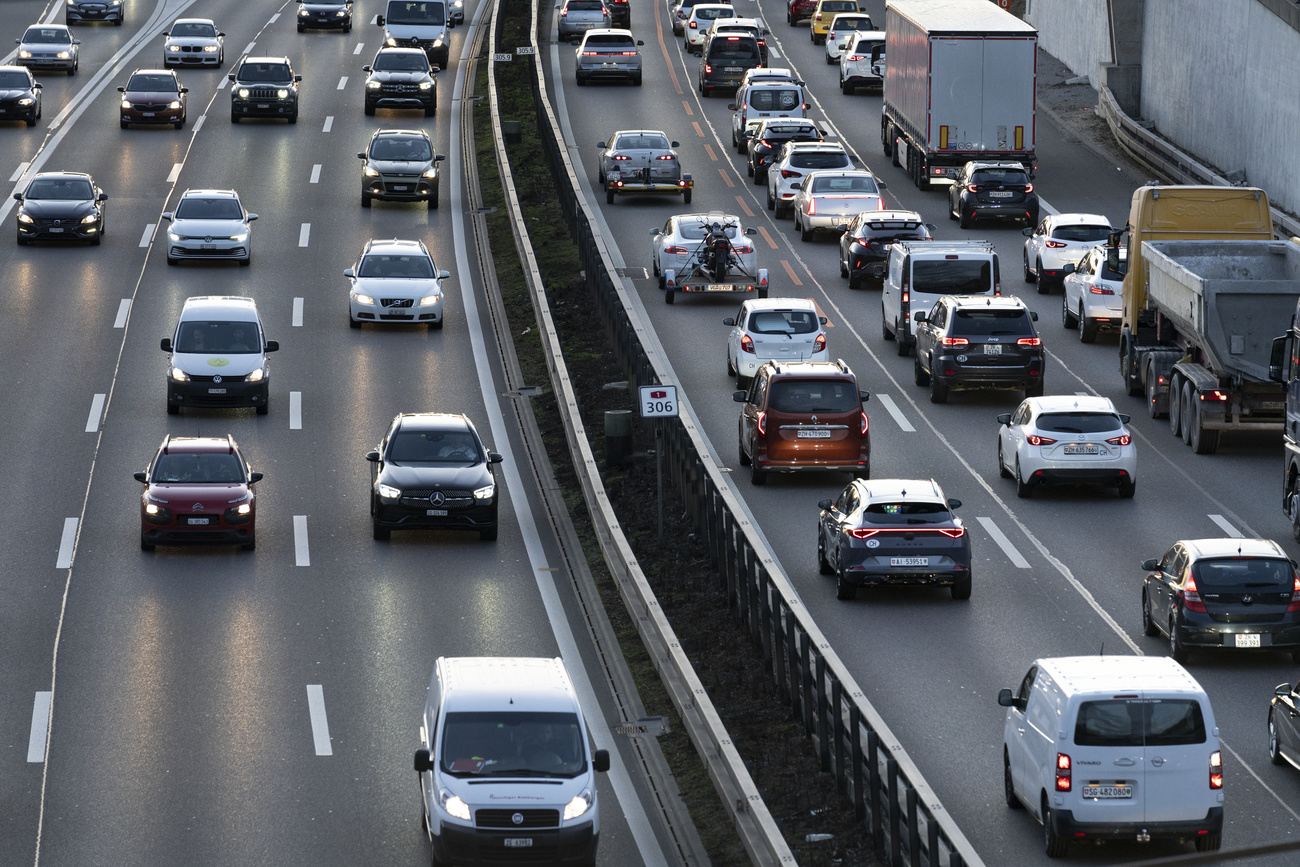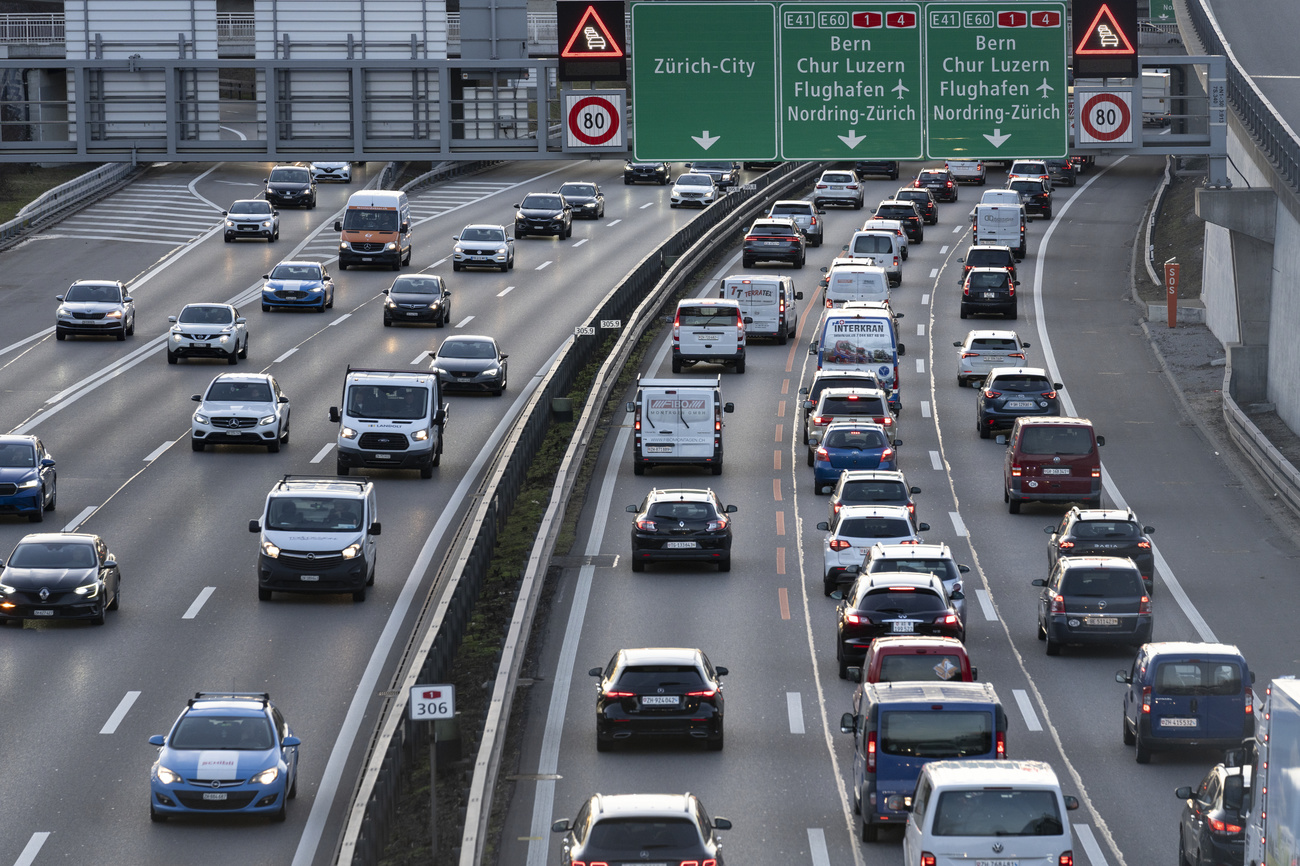
Motorway expansion vote: ‘We need to rethink the way we travel’
Should Switzerland expand part of its motorway network? The two guests in our Let's Talk filmed debate discuss the government's plan to solve the problem of traffic congestion, which is being put to a national vote on November 24.
In 2023, motorists were stuck on Swiss roads for 48,807 hours, according to the Federal Roads Office. This figure has risen steadily in recent years.
To combat the problem, the government and parliament want to widen the A1 motorway between Bern and Zurich and between Lausanne and Geneva. However, the project is not to the liking of environmental associations, which have launched a referendum. The people will vote on the subject on November 24.

More
Record-breaking traffic jams on Swiss roads
Obsolete or over-polluting motorways?
Brenda Tuosto, a parliamentarian from the left-wing Social Democratic Party believes that extending motorways is not a solution. “When you widen a road, you get the impression that the traffic flows more smoothly for a while. The problem is that very quickly the traffic jams will build up again and shift elsewhere at the entrances to towns,” she says.
Jacqueline de Quattro, a parliamentarian from the centre-right Radical-Liberal Party, believes that the Swiss motorway network needs to be modernised. “It was built in the 1960s for a Switzerland of 5.3 million inhabitants. Now we have nine million inhabitants and we can see that the motorways are hopelessly congested at peak times,” she says. She also points out that traffic is shifting to the towns and villages adjacent to motorways, subjecting inhabitants to considerable nuisance.

More
Voters could scupper Swiss motorway extension plans
“We need to rethink the way we travel,” Tuosto admits. However, she points out that the government has committed itself to achieving carbon neutrality by 2050, by ratifying the Paris Agreement. “We won’t be able to achieve that objective by extending motorways,” she says.
Jacqueline de Quattro points out that traffic jams increase pollution, as vehicles are constantly stopping and starting, thereby consuming more petrol. “We’re not going to widen the motorways for the sake of it. We’re going to remove the bottlenecks. It’s not a question of putting in a third lane everywhere, but of widening at specific points,” she explains.
Rail must also be developed
For Tuosto, the priority is to develop rail infrastructure. “The needs are particularly great in French-speaking Switzerland, where we can see that journey times are increasing everywhere,” she says. This view is shared by Jacqueline de Quattro, who recognises the need to invest in the railways. But she believes that this does not prevent road infrastructure from being modernised.
“If we had an extendable budget, we could develop rail and road at the same time,” Tuosto counters. “But that’s not the case, because the government is asking us to make cuts in certain areas. So we have to prioritise.”
Jacqueline de Quattro, on the other hand, believes that funding the motorway extension project would in no way detract from funding rail development. “We don’t have to dip into the government’s regular budget, since special funds are earmarked for both rail and road.”
More
An intermodal mobility policy
In parallel with its project to extend the A1 motorway, the government is also planning to develop electric mobility. In particular, it plans to equip around 100 rest areas along the national motorways with fast chargers by 2030.
“Electric cars will certainly emit less CO2, but that doesn’t completely solve the problem, because they are also vehicles that will take up space on the motorway,” says Brenda Tuosto.
She therefore advocates the introduction of an “intermodal mobility policy”, combining several means of transport, while investing massively in rail and reducing ticket costs for the railways.
“I’m convinced that we’ll be able to do something intelligent if we focus on the complementary nature of different means of transport,” Jacqueline de Quattro says, pointing out that people living in the countryside can’t always rely on public transport to get around. “However, I wouldn’t want the proven need for investment in railways to cause the motorway widening project to fail in the vote, because it will really help us to improve traffic flow,” she says.
Full details of the motorway widening project to be put to the vote on November 24:

More
Voters to decide on major Swiss motorway expansion




























You can find an overview of ongoing debates with our journalists here . Please join us!
If you want to start a conversation about a topic raised in this article or want to report factual errors, email us at english@swissinfo.ch.